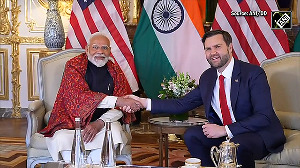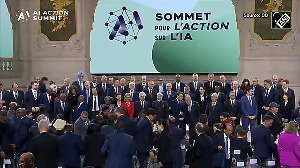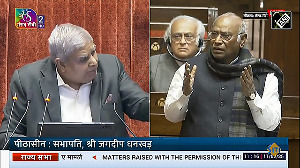India has stuck to its Doha stance on Trips (Trade-Related Intellectual Property Rights) and public health, Singapore issues, agriculture and services.
The country's position in these areas remains unchanged as evident in a position paper circulated by the commerce ministry among political parties and trade unions to elicit their views.
The paper said implementation issues relating to the Uruguay Round of negotiations could be addressed before the next month's World Trade Organisation ministerial meeting in Cancun if developed countries showed political will.
The paper has identified operationalisation of Article 15 of the anti-dumping agreement which provides for concessions to developing countries, countervailing duty investigation procedures and issues related to sharing of information on export values, as issues that interest India.
In addition, the paper flags disclosure regarding traditional knowledge in patent applications and extension of the multilateral register to products other than wines and spirits for immediate attention.
Agriculture
The paper said India's position was underpinned by the recognition that developing countries could be expected to reciprocate in market access, subject to their economic and social conditions, development needs, food and livelihood security and rural development requirements.
The developing countries will agree to the tariff reduction proposal if they get adequate commitment from the developed countries, the paper adds.
New Delhi is of the opinion that there should be no minimum reduction in each tariff line and has said India and 74 other countries are in favour of the Uruguay Round modalities for further commitments.
The country has reiterated its demand for a lower rate of tariff cut of 10 per cent for special products with a minimum per tariff line reduction of 5 per cent. India has also asked for a new special safeguard mechanism for developing countries.
While seeking reduction in trade-distorting import and export subsidies, India has sought flexibility to address its food and livelihood security concerns.
Services
Pushing for relaxations under Mode 4 to enable freer movement of natural persons, India will make requests to trading partners to permit its personnel to offer accountancy, construction, engineering and educational services.
The requests on health, architecture, tourism, maritime trade, and audio visual and computer-related services have already been made, the position paper says.
India is not too happy with the initial offers submitted by the WTO members as there is little tangible progress, the paper said.
New Delhi is finalising the offers which will indicate the extent of opening up of the markets. Services like auditing, law and retail will not be opened up.
TRIPs and public health
India is critical of the US proposal to restrict coverage for waiver of patent rights in case of epidemics to diseases like HIV, AIDS, tuberculosis and malaria.
"Sars indicates how quickly a totally unanticipated situation may arise, threatening vast regions," the position paper said.
It added that public health should not only cover diseases but also include other natural and man-made disasters like the Bhopal gas tragedy or the Chernobyl disaster.
Singapore issues
India has maintained its opposition to the issues such as investment, competition policy, trade facilitation and transparency in government procurements, saying the areas required more analysis before countries could think of rule making in the WTO.
It argued that the Doha mandate was to continue the study process and negotiations could only be initiated after an explicit consensus, both on the commencement of talks and the modalities. A multilateral agreement on investment did not promise additional inflows, the paper said.
India is of the opinion that the entry and establishment have remained in the sovereign domain of host countries and an external dispute settlement mechanism would question sovereign powers.
The paper said the proposal to have voluntary co-operation on competition policy, as distinct from competition laws, encompasses a host of issues including trade, investment and industrial policies.
In a situation of non-binding arrangement, the less developed members with lower economic clout stood to lose, it added.
On trade facilitation, the government said that countries were at various stages of development and there was not much strength in the argument for binding WTO members.
The softest line was taken on transparency in government procurements with the paper saying that India did not object to the proposal or any other requirement to provide information about its system of public procurement.
But concerns have been raised about the prescribing procedures and commitments to implement such provisions.






 © 2025
© 2025